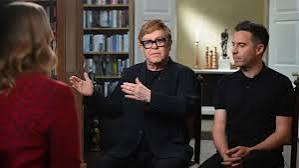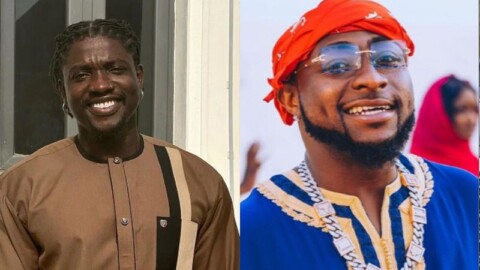Sir Elton John has launched a fierce criticism of the UK government, calling them “absolute losers” and expressing his deep sense of betrayal over their plans to exempt technology firms from copyright laws.
In an exclusive interview with Sunday with Laura Kuenssberg, the legendary singer did not hold back, condemning the government’s decision to potentially allow artificial intelligence (AI) companies to use artists’ creative content without compensation.
“If ministers go ahead with these plans,” he declared, “they would be committing theft, thievery on a high scale.”
The government’s stance has sparked widespread concern among creators. This week, they rejected a proposal from the House of Lords that would have required AI companies to be transparent about the material they use to develop their programs.
A government spokesperson insisted that “no changes” to copyright laws would be “considered unless we are completely satisfied they work for creators.”
But Sir Elton was unconvinced, warning that such assurances were empty promises. “It’s criminal, in that I feel incredibly betrayed,” he said with a visible mix of frustration and anger.
Generative AI technology relies on vast amounts of data—text, images, music—sourced from the internet to create new content that mimics human creativity.
For artists like Sir Elton, this raises a fundamental issue of fairness. “The danger is that, for young artists, they haven’t got the resources… to fight big tech [firms],” he explained.
“They’re being exploited before they even have a chance to build their careers.” His words highlighted the growing fear that technology giants could use creators’ work without permission, threatening their ability to earn a living.
Recalling the recent parliamentary battle over the issue, Sir Elton expressed outrage at how the government dismissed a decisive House of Lords vote in favor of protecting creators’ rights.
“The House of Lords did a vote, and it was more than two to one in our favour,” he said.
“The government just looked at it as if to say, ‘Hmm, well the old people… like me can afford it.'”
His criticism exposed what he saw as a fundamental disregard for creators who lack the wealth and influence to defend their rights.
The clash began on Monday, when the House of Lords voted by a 147 majority to amend the Data (Use and Access) Bill, introducing transparency requirements that would force AI companies to disclose and seek permission for the content they use.
But by Wednesday, Members of Parliament in the House of Commons voted to reject this amendment, leaving the bill in a state of limbo as it continues to bounce between the two Houses.
For Sir Elton, this political back-and-forth only deepened his frustration. “They’re going to rob young people of their legacy and their income,” he warned.
“The government is just being absolute losers, and I’m very angry about it.”
His criticism extended directly to the country’s leadership. Sir Elton called on Prime Minister Sir Keir Starmer to “wise up” and take the concerns of creators seriously.
He was even less charitable toward Technology Secretary Peter Kyle, whom he dismissed as “a bit of a moron.”
For Sir Elton, the government’s refusal to act was not just a policy failure but a betrayal of the very foundation of creative industries. “They are siding with big tech at the expense of artists,” he argued.
Determined to defend his rights and those of his fellow creators, Sir Elton made it clear that he was prepared to escalate the fight if necessary.
“If the government does not change its plans, we will be ready to take ministers to court,” he vowed.
“We’ll fight it all the way.” His words reflected the rising anger among musicians, writers, and artists who fear that their work is being turned into a free resource for AI developers.
Sir Elton’s outburst has already sparked a debate about the balance between technological innovation and creative rights.
For many, his stand is a reminder that even in an age of rapid technological progress, the human creativity that powers music, art, and literature must not be taken for granted.
“This isn’t just about me,” he insisted. “It’s about protecting the next generation of artists from being exploited.”
Standing beside the iconic 78-year-old Sir Elton John, renowned playwright James Graham voiced his growing frustration with the UK government’s approach to copyright laws.
“Ministers do understand the value of creativity,” he acknowledged, “but what’s frustrating is either the complacency or the willingness to let Silicon Valley tech bros get it all their own way.”
His words underscored a deepening sense of betrayal among the creative community, who feel their rights are being sacrificed for the benefit of powerful technology companies.
Tom Kiehl, the chief executive of UK Music, echoed these concerns in a passionate interview with the BBC.
“The government is on the brink of offering up the country’s music industry as a sacrificial lamb in its efforts to cosy up to American-based tech giants,” he warned.
Kiehl did not mince words, urging the prime minister to resist any temptation to abandon the country’s creators.
“He must not sell the next generation of singers, songwriters, musicians, and music creators down the river,” he insisted, “allowing all that talent to be crushed by letting soulless AI bots plunder their work.”
The anxiety within the artistic community reached a crescendo ahead of the House of Lords vote, with Sir Elton joining more than 400 British musicians, writers, and artists in signing an open letter to the prime minister.
The letter called for urgent reforms to copyright laws that would ensure creators were properly protected against the unchecked growth of artificial intelligence.
It was a united stand, symbolizing the determination of the UK’s creative talents to defend their rights and their livelihoods.
Among the signatories was Beatles legend Sir Paul McCartney, who had previously expressed his own fears about the dangers of unregulated AI.
In a candid interview with the BBC, he warned that without proper protections, the music industry could descend into a “Wild West,” where artists’ copyright would be routinely ignored.
“We’re talking about a situation where anyone could just take your work, repackage it, and make money off it without you seeing a penny,” McCartney cautioned.
His words carried the weight of decades of experience as one of the world’s most influential musicians.
In response to the mounting criticism, a government spokesperson attempted to reassure the creative sector, insisting that ministers wanted both the UK’s creative industries and its AI companies to “flourish.”
“That is why we’re consulting on a package of measures that we hope will work for both sectors,” they explained.
But the vagueness of these promises did little to calm the fears of creators who saw their livelihoods under threat. For them, the government’s words rang hollow.
The spokesperson further emphasized the importance of “working through responses to a consultation” on the contentious proposals, which would allow AI developers to use creators’ content unless the rights holders opted out.
“It is vital we put in the groundwork now as we consider the next steps,” they added.
The promise of a report and an economic impact assessment seemed a far cry from the immediate protection creators were demanding.
But for Sir Elton, James Graham, Tom Kiehl, and the hundreds of artists who signed the letter, the issue was clear: creators were not asking for favors, they were demanding fairness.
As Sir Elton had put it bluntly, “We are not trying to stop innovation. We are just asking that our work be respected.”
It was a fight not just for the rights of the famous but for the countless young creators whose voices risked being lost in a world increasingly dominated by artificial intelligence.







